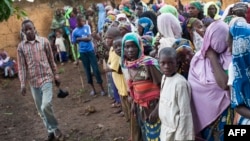Close to 100,000 Central African Republicans who fled violence at home are taking refuge in Cameroon. But many are finding life in the refugee camps also difficult. Some are trying to start a new life by opening little businesses in Cameroonian villages - but face resistance.
Refugees here at the Timangolo camp are welcoming the newest arrival: Ahmadou Bachirou. He looks sick and tired after traveling 300 kilometers from the Central African Republic town of Bambari.
He says he is 70 years old and could not walk that far so he rode a donkey - which died once he crossed into Cameroon. He expects he will never return to his troubled country - where almost all his family has been killed and his cattle seized by gun men. Still, he says, he is happy to be alive and tackle the challenges that await him at the camp.
Challenges of meeting basic needs
One of those challenges is getting enough drinkable water. Martin Bivina says he struggles to distribute small quantities of the precious liquid brought into the Timangolo camp each day by the United Nations Food Program.
He says each reservoir contains just 5,000 liters of water to distribute to 7,000 people.
Timangolo is just one of several localities in Cameroon that host the tens of thousands of C.A.R. refugees fleeing ethnic and sectarian violence that began in 2013.
With the prospects of going home unlikely anytime soon, some refugees are trying to make a life here. One of them, 26 year old refugee Ahmadou Ahmidou says he can not get all the basic services he needs for his family, such as water, healthcare and education. So he had to start a little business. He transports people on a motorbike he brought from home and this helps him support his sick daughter and wife.
He says he makes an average of $10 a day and that he is happy with Cameroon policemen that protect them from angry and unwelcoming Cameroonians.
Many Cameroon residents and authorities say refugees outside the camps present security risks to their communities. In one recent incident last month, a group posing as C.A.R. refugees kidnapped 12 Cameroonians to press for the release of Abdoulaye Meskine, an anti-balaka leader detained in Cameroon.
Aids agencies are also discouraging refugees from trying to integrate into Cameroon where they face hostility and other challenges. Joseph Zapater, of the UNHCR, says his group is working with the Cameroon government on a better system to monitor movements to protect both the refugees and Cameroonians.
He says they are encouraging the refugees to stay in their camps because Cameroonian authorities have been complaining that when they go out, there is tension with their host communities. He adds that now they have a register of all the refugees who go out to meet relatives in Cameroon for better tracking.
Local groups also providing help
But not all refugee assistance is coming from global bodies like the United Nations. Many home-grown Cameroon groups are helping. Magdalein Ondua is head of the non-governmental organization Cameroon Women for Peaceful Diplomacy.
She says they are visiting with the United Nations to comfort the refugees and that they cater to the basic needs of women and children - worst impacted by the crisis in the CAR. She says by helping the women and children, they are also reducing the burden of men who toil to provide for them.
The United Nations Refugee Agency in October appealed for more donations to help Central Africans. Inter-communal violence and killings by the predominantly Muslim Seleka and its rival, the Christian anti-Balaka, continue despite the presence of international peacekeepers.
Cameroon has also issued a call for regional and international assistance having exhausted its resources to help the refugees. The C.A.R. is not the only country on its borders with violent conflict. Nigerians have also been fleeing violence by the Boko Haram insurgency. The twin crises have resulted in close to 300,000 people taking refuge in Cameroon.




